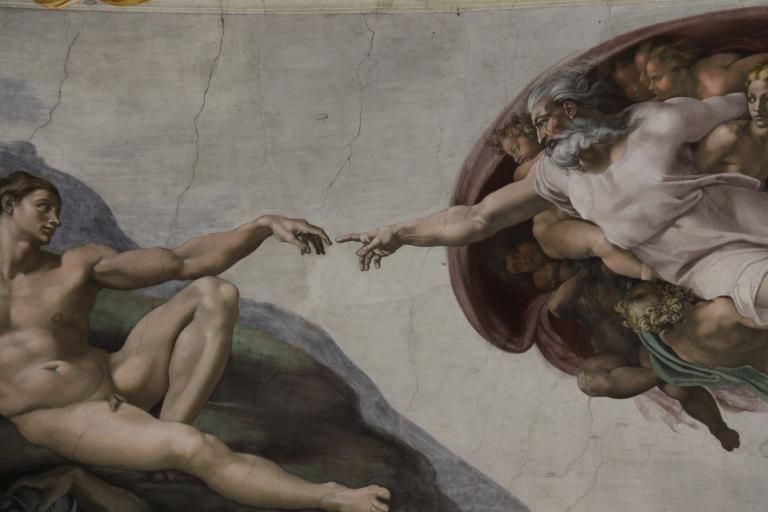 Giles Fraser, a British priest, wrote an article for The Guardian newspaper entitled ‘I don’t believe in the God that Stephen Fry doesn’t believe in either‘. Many Christians would say the same about Richard Dawkins’ depiction of God as “the most unpleasant character in all fiction”. Erik Strandness shares his thoughts about the naturalistic worldview and the character of God.
Giles Fraser, a British priest, wrote an article for The Guardian newspaper entitled ‘I don’t believe in the God that Stephen Fry doesn’t believe in either‘. Many Christians would say the same about Richard Dawkins’ depiction of God as “the most unpleasant character in all fiction”. Erik Strandness shares his thoughts about the naturalistic worldview and the character of God.
The God of the Old Testament is arguably the most unpleasant character in all fiction: jealous and proud of it; a petty, unjust, unforgiving control-freak; a vindictive, bloodthirsty ethnic cleanser; a misogynistic, homophobic, racist, infanticidal, genocidal, filicidal, pestilential, megalomaniacal, sadomasochistic, capriciously malevolent bully.” (Richard Dawkins – The God Delusion)
Atheist Dan Barker and Reverend Martin Kuhrt debated the validity of Dawkins’ statement on a recent episode of Unbelievable?. Barker, a former pastor turned atheist, was recruited by Richard Dawkins to do the scriptural heavy lifting for his jeremiad against the God of the Old Testament (OT) and the result was his book, God: The Most Unpleasant Character in All Fiction. Kuhrt, after reading both Dawkins’ and Barker’s books, felt that God had been misrepresented and penned his own response, God is Good: Exploring the Character of the Biblical God.
Barker brings a biblical sensibility to Dawkins’ critique. He is well-versed in scripture and doesn’t tolerate Christians who sweep the difficult passages under the rug. Kuhrt, on the other hand, takes the Bible quite seriously and met Barker’s challenge head on in this spirited debate. While the show only covered three of the divine character flaws identified by Dawkins, it nonetheless highlighted the core issues involved in atheistic and Christian approaches to the OT.
Exegesis or Extermination
I think it’s completely fair to engage in proper biblical interpretation but it appears that Barker and Dawkins are more interested in exterminating God rather than properly exegeting His character. Dawkins’ ode to a divine despot may serve as primal scream therapy for his devotees, but I don’t think it is the best apologetic strategy for converting believers into atheists.
Barker claims that his goal is to reveal truth but the problem is his book is based on a series of derogatory epithets that feel more like a slap in the face than an invitation to thoughtful dialogue. He defended himself on Unbelievable? by saying:
“These are characteristics, these are not slurs, they are not attacks on the Bible. This is God Himself, this is His own words and His own actions. It’s not like Richard and I are attacking God, we’re letting Him speak for Himself.”
Barker compared his work to that of a physician who hates cancer and wants to rid the body of it:
“Would you accuse a doctor who is fighting cancer of being vitriolic?…We think it’s a cancer. We think revealed religion, especially, is something that needs to be excised for the good of society.”
The problem is that calling a tumor names doesn’t make it go away. An oncologist must thoroughly understand cancer in order to properly fight it. He or she must know its type, understand its mechanism, and apply targeted therapy so as to minimize harm to the one afflicted. Criticizing the deeply cherished beliefs of religious people seems a poor strategy for recruiting workers to construct a Godless world.
“Though the details differ across the world, no known culture lacks some version of the time-consuming, wealth-consuming, hostility-provoking rituals, the anti-factual, counter-productive fantasies of religion.”(Richard Dawkins – The God Delusion)
As Christians, we need to put on our big boy pants and deal with these difficult verses. I applaud Barker for offering his pastoral opinion but when the premise of his book is divine name-calling it becomes very hard for me to take his concerns seriously. While his book will preach to the atheist choir, the title alone is unappealing to those he most wants to convince. I have read Dawkins and Hitchens and appreciate their arguments, but rather than clearing my vision, I feel like all they really did was repeatedly poke me in the eye for being a Christian. One example of such harsh rhetoric reads like this:
“It is fashionable to wax apocalyptic about the threat to humanity posed by the AIDS virus, ‘mad cow’ disease, and many others but I think a case can be made that faith is one of the world’s great evils, comparable to the smallpox virus but harder to eradicate.” (Richard Dawkins – ‘Is Science Religion?’ The Humanist, vol. 57, no. 1)
Must Not We Ourselves Become Gods?
“‘Whither is God?’ he cried. I shall tell you. We have killed Him – you and I. All of us are His murderers….How shall we, the murderers of all murderers, comfort ourselves? What was holiest and most powerful of all that the world has yet owned has bled to death under our knives. Who will wipe the blood off us? What water is there for us to clean ourselves? What festivals of atonement, what sacred games shall we have to invent? Is not the greatness of this deed too great for us? Must not we ourselves become gods simply to seem worthy of it? (Friedrich Nietzsche – The Parable of the Madman)
Nietzsche declared in The Parable of the Madman that God was dead but then warned those who murdered Him that they had to step up to the plate and take His place. Barker and Dawkins are similarly intent on exterminating God but they must also heed the Madman’s warning and show us how to build a world of love, understanding and morality with just matter and energy. Atheists need to prove that evolved creatures with a god complex are capable of constructing a better world. Sadly, I find humanity’s curriculum vitae lacking in any type of divine experience that would recommend them for the job.
As a physician who has walked many parents through the death of their babies, I find that survival of the fittest makes for a very poor counseling strategy for grieving families. The materialist minority may dismiss religion as an illusory salve for suffering, but I have found that applying a poultice of “nature red in tooth and claw” only infects an already deep emotional wound. In order for me to be convinced that atheism is true, I need a treatise on how a materialist view of the world will make me a better physician and allow me to deal with both the physical and spiritual needs of my patients.
Internal Affairs
The character of God is a Judeo-Christian problem and not an atheist problem. Christians need to address the difficult passages but if atheism is just a lack of belief in God then giving God a tongue lashing seems a terrible waste of their valuable time. Atheists, however, also have an internal problem because they need to rehabilitate the questionable character of their own natural selection creator if they hope to convince others to enthusiastically embrace their materialist vision of the world.
Atheists try to transform natural selection into the secret sauce that makes life palatable, but continue to encounter resistance from a majority of the people who just find it distasteful. Barker would, no doubt, argue that species have become extinct throughout history and that God ultimately needs to explain that as well. I concur, but the difference is that I retain an image-bearing memory of Eden that recoils at the deaths of evolutionary misfits, while Barker has no choice but to embrace it as the wisdom of his maker. At least Christians worship a God who died on behalf of the broken rather than a natural selection that kicks them when they’re down.
Jesus Exegesis
We Christians cannot sweep the OT under the rug because the founder and perfecter of our faith embraced it. The OT does present some challenges but we must exegete and not evade. Jesus acknowledged Adam and Eve, Noah, Abraham, Isaac and Jacob, Moses, David and Daniel, so before we whitewash their tombs, we also need to acknowledge that they were stinky sinners in need of a savior. I find it fascinating that the Bible isn’t afraid to discuss these issues, so maybe rather than disparaging God, we should applaud Him for fostering the discussion in the first place. While Barker may question the character of ‘the OT God’ we need to remember that Jesus called Him ‘daddy’ and rather than treat Jesus as an aberration, we need to accept the fact that He was a chip off the Ancient of Days block.
Barker wants us to dismiss the whole Bible based primarily on his evaluation of the God of the OT:
“What we want, like most good people want…a world with more love, a world with more understanding, a world with less violence… you don’t find that in the Bible.”
Christianity, however, is a continuation of the OT and we separate the two at our own peril. We need to remember that the Old and New Testament (NT) constitute a vector which points to Jesus. It was the way in which the Jewish people were set apart that allowed us to look back and see God’s salvation trajectory. Many of the OT customs that Barker finds odd or detestable were put in place to set the Chosen People apart, and while he may not like them, he has to admit that God did a pretty good job of setting them apart from every other Ancient Near Eastern culture. If you isolate the OT then you interrupt the narrative flow of the greatest story ever told but if you appropriately follow it into the NT you see that God gets the last WORD.
Barker does try to burst the Christian bubble by taking on Jesus in one of the last chapters of his book. Barker’s attacks amount to berating Jesus for identifying Himself with the OT God that he has just spent the majority of his book denigrating. He gave Jesus props for some healing and pithy aphorisms, but then pointed to his bouts of anger and obsession with weeping and gnashing. Sadly, Barker engaged in the very cherry-picking of verses that he accused Christians of and missed the real Jesus.
Jesus, however, continues to be admired by people all along the religious spectrum. He is described as a great moral teacher, prophet, enlightened bodhisattva, divine avatar and Son of God, descriptions which would be quite odd if Jesus was truly as bad as Barker describes. It appears that Jesus may actually be one of the most pleasant characters in all of history.
The Most Unpleasant Theory in All of Science
If Barker wants a world of love, understanding and non-violence then he needs to take the next step and write a book defending his colleague’s assessment of our human condition, a condition which surprisingly has no categories for evil or good.
In a universe of electrons and selfish genes, blind physical forces and genetic replication, some people are going to get hurt, other people are going to get lucky, and you won’t find any rhyme or reason in it, nor any justice. The universe that we observe has precisely the properties we should expect if there is, at bottom, no design, no purpose, no evil, no good, nothing but pitiless indifference.” (Richard Dawkins – River Out of Eden: A Darwinian View of Life)
It appears that Barker’s outrage over the qualities of the most unpleasant character in all of fiction owes a greater debt to moral image-bearing than “blind pitiless indifference”. Character assassination of a fictional plot device hardly seems an appropriate apologetic for those forced to dance to the tune of their selfish genes. In the name of fairness, Barker must also put Neo-Darwinian theory under the moral microscope because Dawkins’ statement sounds a lot like he has just described the most unpleasant theory in all of science.












